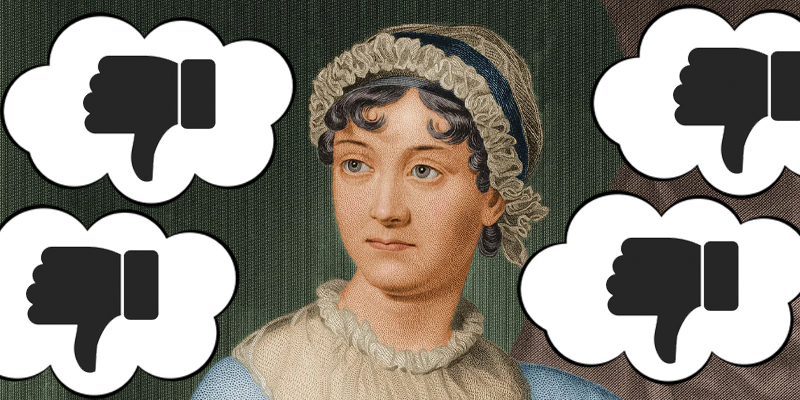July 9, 2025, 10:50am
Famously, Jane Austen disliked Bath, both when she visited it in 1799 and when she moved there with her family in 1801. But Bath loves Jane Austen: the city is now home to the Jane Austen Center, an annual Jane Austen Festival, and many other touristy delights. For Austen’s 250th birthday this year, the city is presenting, among other things, an exhibition about Austen’s distaste for it, entitled “The Most Tiresome Place in the World: Jane Austen & Bath.” Know thyself! Anyway, it made me wonder what else Jane Austen found tiresome, and it turns out, quite a bit. (Same.) Here are a few things your favorite writer did not prefer:
Bath
Apparently she even fainted when informed that she was going to have to move there. Not only did she dislike Bath, describing it as “all vapor, shadow, smoke & confusion,” but she didn’t get any writing done there, a devastating blow for any city.
The name “Richard”
Famously, in the opening lines of Northanger Abbey, Austen takes a little dig at the name “Richard,” writing “[Catherine’s] father was a clergyman, without being neglected, or poor, and a very respectable man, though his name was Richard—and he had never been handsome.” In the annotated edition, David M. Shapard notes that Austen echoes her dislike of the name in a 1796 letter, writing “Mr. Richard Harvey’s match is put off, till he has got a Better Christian name, of which he has great Hopes.” Shapard adds that she “never uses the name for a speaking character in her novels,” but there is no obvious reason for her aversion. “It may have been an inside joke among her family, or at least with her sister (the recipient of the letter), though that cannot fully explain why she should include the joke in a work intended for publication. One commentator [F. B. Pinion] speculates that the popularity during this period of Shakespeare’s Richard III, whose title character is a monster of iniquity, may have created a general animosity toward the name.”
The Prince Regent
Austen disliked the Prince Regent (who would later be crowned George IV) intensely, despite the fact that he was not only a fan of her work, but possibly her very first buyer. In an 1813 letter, Austen wrote of the prince’s wife, Princess Caroline of Brunswick, “Poor woman, I shall support her as long as I can, because she is a Woman, & because I hate her Husband.” She was “invited” by the prince to dedicate one of her books to him, and she did, though the result is “famously unenthusiastic,” as Alison Flood writes: “To his Royal Highness, the Prince Regent, this work is, by His Royal Highness’s Permission, most Respectfully Dedicated by his Royal Highness’s Dutiful and Obedient Humble Servant.” Ouch.
Ramsgate
The seaside town of Ramsgate features unfavorably in both Pride and Prejudice and Mansfield Park, and Austen dinged it in a 1813 letter to her sister-in-law, writing “Ed Hussey talks of fixing at Ramsgate—Bad Taste!” Local historian Norman Thomas has hypothesized that her dislike had something to do with her brother Francis, who was stationed there as a Navy officer, and married a local woman. “We know Jane loved her brother very much,” Thomas said. “It could be that she sort of blamed Ramsgate and its women for stealing him away from the family. She actually wrote a poem called ‘Post Haste from Thanet’ to celebrate the marriage of her brother Frank to this Ramsgate woman. And then you start to think, well maybe consciously or unconsciously, she identified Ramsgate as the place where she lost her brother.” (It also might have meant nothing at all.)
The dentist
Who “must be a Lover of Teeth & Money & Mischief.” (Though in the 19th century, who wouldn’t dread the dentist?)
Evangelicals
In a 1809 letter to her sister Cassandra, Austen wrote “I do not like the Evangelicals.” (But by 1814, she had changed her mind, writing to her niece Fanny Knight that “I am by no means convinced that we ought not all to be Evangelicals, & am at least persuaded that they who are so from Reason & Feeling, must be happiest & safest.”)
People who pretend to like music too much
“She seems to have had, besides a dislike for much expression of religious enthusiasm, a dislike for anything bordering on an affectation of enthusiasm for music,” writes Elizabeth Jenkins in her 1948 biography of Austen. “Today such an affectation is almost unknown; the majority of people who do not care for music do not imagine that they make themselves more interesting by pretending that they do, but when diversions were relatively few, and, while general information was scanty, the standard of accomplishments was high, there was a temptation to pretend to musical fervor which is quite outside our experience.” (She did like music herself, though was never extra about it.)
Practical marriages
“Anything is to be preferred or endured rather than marrying without Affection,” Austen wrote to her niece Fanny Knight in 1814.
Walter Scott (sort of)
“Walter Scott has no business to write novels, especially good ones,” she wrote to her niece Anna. “It is not fair. He has fame and profit enough as a poet, and should not be taking the bread out of the mouths of other people. I do not like him, and do not mean to like Waverley if I can help it, but fear I must.”
